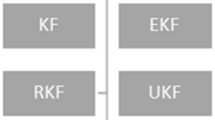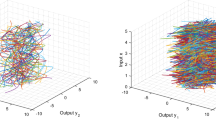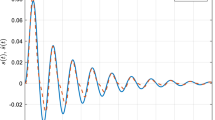Abstract
To identify systems with non-uniformly sampled input data, a recursive Bayesian identification algorithm with covariance resetting is proposed. Using estimated noise transfer function as a dynamic filter, the system with colored noise is transformed into the system with white noise. In order to improve estimates, the estimated noise variance is employed as a weighting factor in the algorithm. Meanwhile, a modified covariance resetting method is also integrated in the proposed algorithm to increase the convergence rate. A numerical example and an industrial example validate the proposed algorithm.
Similar content being viewed by others
References
F. Ding. System IdentificationNew Theory and Methods, Beijing, China: Science Press, pp. 117–131, 2013. (in Chinese)
F. Ding. System IdentificationPerformances Analysis for Identification Methods, Beijing, China: Science Press, pp. 1–12, 2014. (in Chinese)
F. Ding. System IdentificationMulti-Innovation Identification Theory and Methods, Beijing, China: Science Press, pp. 1–29, 2016. (in Chinese)
Y. J. Liu, F. Ding, Y. Shi. Least squares estimation for a class of non-uniformly sampled systems based on the hierarchical identification principle. Circuits, Systems, and Signal Processing, vol. 31, no. 6, pp. 1985–2000, 2012.
S. Wang, V. Dinavahi, J. Xiao. Multi-rate real-time modelbased parameter estimation and state identification for induction motors. IET Electric Power Applications, vol.7, no. 1, pp. 77–86, 2013.
W. H. Li, S. L. Shah, D. Y. Xiao. Kalman filters in nonuniformly sampled multirate systems: For FDI and beyond. Automatica, vol. 44, no. 1, pp. 199–208, 2008.
Y. Shi, T. W. Chen. 2-norm-based iterative design of filterbank transceivers: A control perspective. Journal of Control Science and Engineering, vol. 2008, Article number 143085, 2008.
Y. Shi, F. Ding, T. W. Chen. 2-norm based recursive design of transmultiplexers with designable filter length. Circuits, Systems and Signal Processing, vol. 25, no. 4, pp. 447–462, 2006.
R. D. Gudi, S. L. Shah, M. R. Gray. Adaptive multirate state and parameter estimation strategies with application to a bioreactor. AIChE Journal, vol. 41, no. 11, pp. 2451–2464, 1995.
D. Q. Wang. Least squares-based recursive and iterative estimation for output error moving average systems using data filtering. IET Control Theory & Application, vol.5, no. 14, pp. 1648–1657, 2011.
F. W. Chen, H. Garnier, M. Gilson, J. C. Agüero, B. I. Godoy. Identification of continuous-time transfer function models from non-uniformly sampled data in presence of colored noise. In Proceedings of the 19th IFAC World Congress, IFAC, Cape Town, South Africa, pp. 10379–10384, 2014.
L. Xie, Y. J. Liu, H. Z. Yang, F. Ding. Modelling and identification for non-uniformly periodically sampled-data systems. IET Control Theory & Applications, vol. 4, no. 5, pp. 784–794, 2010.
F. Ding, L. Qiu, T. W. Chen. Reconstruction of continuoustime systems from their non-uniformly sampled discretetime systems. Automatica, vol. 45, no. 2, pp. 324–332, 2009.
J. Ding, J. X. Lin. Modified subspace identification for periodically non-uniformly sampled systems by using the lifting technique. Circuits, Systems, and Signal Processing, vol. 33, no. 5, pp. 1439–1449, 2014.
F. Ding, G. J. Liu, X. P. Liu. Partially coupled stochastic gradient identification methods for non-uniformly sampled systems. IEEE Transactions on Automatic Control, vol. 55, no. 8, pp. 1976–1981, 2010.
Y. Zhang, Z. Zhao, G. M. Cui. Auxiliary model method for transfer function estimation from noisy input and output data. Applied Mathematical Modelling, vol. 39, no. 15, pp. 4257–4265, 2015.
Y. Zhang. Unbiased identification of a class of multi-input single-output systems with correlated disturbances using bias compensation methods. Mathematical and Computer Modelling, vol. 53, no. 9–10, pp. 1810–1819, 2011.
Y. Zhang, G. M. Cui. Bias compensation methods for stochastic systems with colored noise. Applied Mathematical Modelling, vol. 35, no. 4, pp. 1709–1716, 2011.
K. H. Yang, W. S. Yu, X. Q. Ji. Rotation estimation for mobile robot based on single-axis gyroscope and monocular camera. International Journal of Automation and Computing, vol. 9, no. 3, pp. 292–298, 2012.
D. K. Arif, Widodo, Salmah, E. Apriliani. Construction of the Kalman filter algorithm on the model reduction. International Journal of Control and Automation, vol. 7, no. 9, pp. 257–270, 2014.
Y. J. Wang, F. Ding. Novel data filtering based parameter identification for multiple-input multiple-output systems using the auxiliary model. Automatica, vol. 71, pp. 308–313, 2016.
Y. J. Wang, F. Ding. Filtering-based iterative identification for multivariable systems. IET Control Theory & Applications, vol. 10, no. 8, pp. 894–902, 2016.
Y. J. Wang, F. Ding. The auxiliary model based hierarchical gradient algorithms and convergence analysis using the filtering technique. Signal Processing, vol. 128, pp. 212–221, 2016.
L. Xie, H. Z. Yang, F. Ding. Recursive least squares parameter estimation for non-uniformly sampled systems based on the data filtering. Mathematical and Computer Modelling, vol. 6, no. 1–2, pp. 315–324, 2011.
Y. J. Liu, L. Xie, F. Ding. An auxiliary model based on a recursive least-squares parameter estimation algorithm for non-uniformly sampled multirate systems. Proceedings of the Institution of Mechanical Engineers, Part I: Journal of Systems and Control Engineering, vol. 223, no. 4, pp. 445–454, 2009.
G. C. Goodwin, M. G. Cea. Application of minimum distortion filtering to identification of linear systems having nonuniform sampling period. System Identification, Environmental Modelling, and Control System Design, L. P. Wang, H. Garnier, Eds., London, UK: Springer, pp. 97–114, 2012.
J. H. Wang, H. X. Jiang, F. Ding. Filtering of non-uniformly multirate sampled-data systems using the lifting technique. In Proceedings of IEEE International Conference on Automation and Logistics, IEEE, Ji’nan, China, pp. 46–50, 2007.
L. P. Yan, B. Xiao, Y. Q. Xia, M. Y. Fu. State estimation for a kind of non-uniform sampling dynamic system. International Journal of Systems Science, vol. 44, no. 10, pp. 1913–1924, 2013.
F. Ding, G. J. Liu, X. P. Liu. Parameter estimation with scarce measurements. Automatica, vol. 47, no. 8, pp. 1646–1655, 2011.
J. Mikleš, M. Fikar. Process Modelling, Identification, and Control, Berlin, Germany: Springer, pp. 221–251, 2007.
D. Y. Xiao. Theory of System Identification with Applications, Beijing, China: Tsinghua University Press, pp. 95–134, 2014. (in Chinese)
L. Ljung. System Identification: Theory for the User, 2nd ed., Englewood Cliffs, USA: Prentice Hall PTR, pp. 197–245, 1999.
G. C. Goodwin, K. S. Sin. Adaptive Filtering Prediction and Control, New York, USA: Dover Publications Inc., pp. 121–150, 2009.
G. E. P. Box, G. M. Jenkins, G. C. Reinsel. Time Series Analysis: Forecasting and Control, New Jersey, USA: John Wiley & Sons, pp. 439–472, 2011.
Author information
Authors and Affiliations
Corresponding author
Additional information
This work was supported by National Natural Science Foundation of China (Nos. 61273142 and 51477070), the Priority Academic Program Development of Jiangsu Higher Education Institutions (PAPD), Foundation for Six Talents by Jiangsu Province and Graduate Scientific Innovation Projects of Jiangsu University (No.KYXX 0003)
Recommended by Associate Editor Ding-Li Yu
Shao-Xue Jing received the B. Sc. degree from Anhui Agriculture University and the M. Sc. degree from Gansu University of Technology, China in 1997 and 2000, respectively. And he received the Ph.D. degree in control theory and control engineering from Shanghai Jiao Tong University, China in 2007. Now he has been a professor in School of Electrical and Information Engineering, Jiangsu University, China.
His research interests include multiple model approach and its application, machine learning, virtual metrology, predictive control and run-to-run control theory and practice, system identification.
Tian-Hong Pan received the B. Sc. degree from Anhui Agriculture University, the M. Sc. degree from Gansu University of Technology, China in 1997 and 2000, respectively. And he received the Ph.D. degree in control theory and control engineering from Shanghai Jiao Tong University, China in 2007. Now he has been a professor in School of Electrical and Information Engineering, Jiangsu University, China.
His research interests include multiple model approach and its application, machine learning, virtual metrology, predictive control and run-to-run control theory and practice, system identification.
Zheng-Ming Li received the B. Sc. degree from the Zhenjiang Institute of Agricultural Machinery, China in 1982, and the M. Sc. degree in control theory and control engineering from the Department of Automation, Xi-an Jiao Tong University, China in 1987. He has been a professor in the School of Electrical Information and Engineering, Jiangsu University, China.
His research interests include modeling of complex processes and wireless sensor network.
Rights and permissions
About this article
Cite this article
Jing, SX., Pan, TH. & Li, ZM. Recursive Bayesian Algorithm for Identification of Systems with Non-uniformly Sampled Input Data. Int. J. Autom. Comput. 15, 335–344 (2018). https://doi.org/10.1007/s11633-017-1073-z
Received:
Accepted:
Published:
Issue Date:
DOI: https://doi.org/10.1007/s11633-017-1073-z




